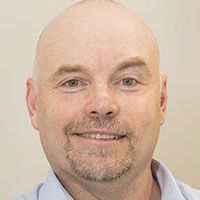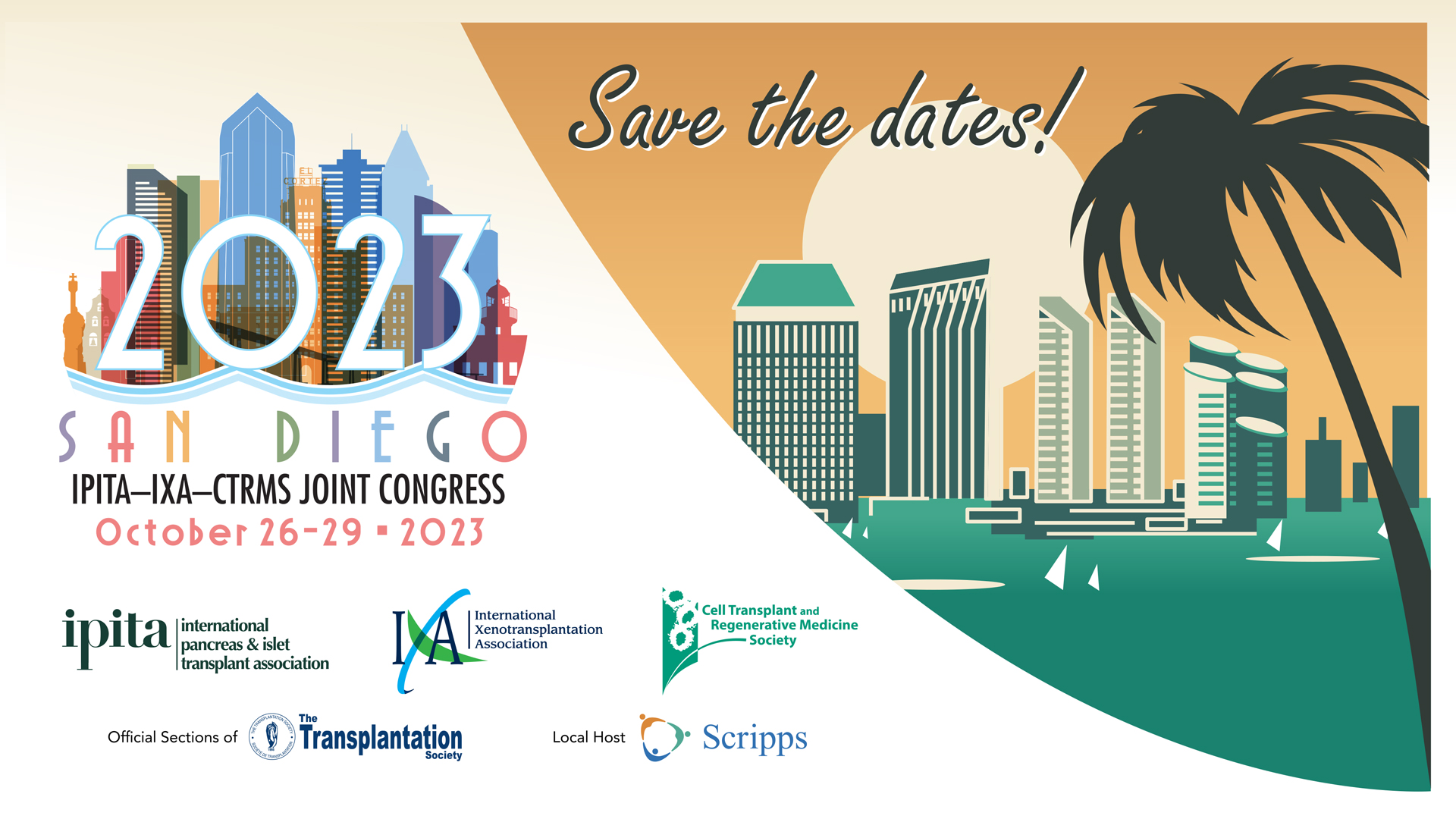- About
- Journal
- Newsletter
- Education
- Searchable Multimedia Library
- 2025 - IXA Congress (Geneva)
- 2023 - IPITA-IXA-CTRMS Joint Congress (San Diego)
- 2021 - IXA-CTRMS Joint Virtual Congress
- 2019 - IXA Congress (Munich)
- 2017 - IXA Congress (Baltimore)
- 2015 - IPITA-IXA-CTRMS Joint Meeting (Melbourne)
- 2013 - IXA Congress (Osaka)
- 2009 - IPITA-IXA Joint Meeting (Venice)
- Resources
- AWARD & GRANTS
- Meetings
- Members Area
- Donate
Member Login
President's Message

Prof. Wayne Hawthorne
University of Sydney, Australia
Dear Friends and colleagues,
I am excited to be able to provide the ongoing updates about our field, with several major achievements taking place in xenotransplantation. These are specifically the publication of the most recent clinical trials undertaken, as reported in our last Newsletter.
We have realized the advent of clinical xenotransplantation, with kidneys and hearts from genetically modified pigs being transplanted into human patients. This has been possible only based on decades of research, preclinical testing in non-human-primate (NHP) models, and provision of these data to support the move to the clinic. At this time, it is important to remember that many pre-clinical trials of ground-breaking importance provide the underpinning of clinical application. These trials are the start of clinical transplants in select cases, including the decedent model of preclinical research as an addendum to NHP models, and potentially, as an additional step to validate NHP data for some organs.
In moving toward the clinic, there have been numerous ideas postulated recently by outside organizations to ensure that all facets are covered appropriately and that xenotransplantation becomes the major advance we have all believed and hope it to be. However, it is important to note that our IXA Council has been working for decades to develop guidance for our xenotransplant community in advance of other organization’s recent interests. The IXA Council along with the IXA membership, experts in various specialties, the TTS and the World Health Organization (WHO) have been working for decades to ensure appropriate guidance and precautions be developed prior to any major clinical trials being undertaken.
In this regard the IXA established a registry following the recommendations by a panel of experts gathered by the WHO in 2005, and the Xenotransplant Inventory was then established with the aim to collect practices of human xenotransplantation worldwide (www.humanxenotransplant.org). The website was activated in October 2006 by the IXA, along with support from the University Hospital Geneva and the WHO; it has been recording data, and providing statistics and reports for over 16 years. In addition, the IXA Council has actively driven the development and publication of relevant guidance documents, position papers, expert panel recommendations, document reviews and development, protocol development and reviews in conjunction with various governments and authorities.
Over many years, IXA has undertaken substantial consultation with national jurisdictions, including the US Food and Drug Administration (FDA), Centre for Biologics Evaluation and Research, Office of Cellular Tissues and Gene Therapies - Tissues (US FDA Cber), Cellular & Gene Therapy (US FDA Cber), and Xenotransplantation (US FDA Cber), the Chinese FDA, the European Medicines Agency (EMA), the Australian Therapeutic Goods Administration (TGA), the (now disbanded) UK Xenotransplantation Interim Regulatory Authority (UKXIRA), Spanish Organizacion Nacional de Transplantes (ONT), The Administración Nacional de Medicamentos, Alimentos Tecnología Médica of Argentine Republic (ANMAT), and the South Korean Ministry of Food and Drug Safety (MFDS). The IXA is continuing to develop updated policy documents and will continue to move forward running joint workshops and meetings to guide policy and guidance for best practice as we move toward clinical trials. We look forward to further rapid advances in our field based on our guidance.
As part of the IXA’s ongoing mission to inform and educate its membership and the broader transplant community, we have conducted polling of our membership. They indicate that they want to learn more about Xenotransplantation and its most recent advances. As one means to address this in line with newer technology platforms, Professor Rita Bottino is developing a Podcast series that will provide some basic insights into the newest advances in our field, with interviews and presentations from senior IXA members.
We look forward to receiving both feedback and suggestions from members across all levels. If you have an interesting topic for discussion as a Podcast, or if you have any feedback you would like to raise, please do so via email to Suzanne Landis suzanne.landis@tts.org at the TTS office, who will direct this on to Rita and the team for review.
The planning has commenced for next year’s tripartite meeting of IPITA, IXA and CTRMS in San Diego, USA between 26th – 30th October 2023. This is the 3rd such joint congress; the Congress Board consisting of the Executives of the three associations are well underway with organising this event. Professor Raja Kandaswamy (IPITA) is the Congress Chair, Professor Wayne Hawthorne (IXA) is the Scientific Program Chair and Professor Klearchos Papas (CTRMS) is the Finance Chair.
The preliminary meeting program has been developed. The Scientific Program Committee are developing the individual sessions, including the Plenary, State of the Art, and individual specialized sessions for the meeting. We are pushing for several combined sessions so that we can share experiences, technologies and information across the joint societies and their attendees, while devoting dedicated sessions to Xenotransplantation. Visit www.sandiego2023.org.

In the new year, please rally your teams and be ready to submit abstracts for this meeting when the call for abstracts comes out. This will be an exciting cutting-edge congress and we hope that many of our IXA members will be able to attend this in-person meeting next year.
Best Regards,
Professor Wayne J. Hawthorne
IXA President

Dr. Jay A. Fishman
Massachussetts General Hospital
Dear Friends,
Just about one year from now we will get together at the 2023 IPITA-IXA-CTRMS joint Congress in San Diego, California. I look forward to the opportunity to meet our members in person and to review new data in the field! A series of new publications in press will address various aspects of clinical trials and safety in xenotransplantation.
This newsletter is focused on two “Faces in Xenotransplantation” who have played central roles in approaches to microbiological safety of pig breeding and clinical xenotransplantation.
Best Wishes,
Jay Fishman, MD
Boston, Massachusetts, USA
Faces in Xenotransplantation

JOACHIM DENNER, PhD
Institute of Virology, Free University Berlin, Germany
READ Bio
Dr. Denner studied biochemistry, specialization in virology. Beginning with his diploma he studied retroviruses, first leukemia viruses of mice, later human endogenous retroviruses (HERVs) and simian and human immunodeficiency viruses (HIV). Dr. Denner developed detection methods and showed that the transmembrane envelope protein of retroviruses is an immunosuppressive protein. He examined expression of HERVs in the human placenta. His laboratory at the Paul Ehrlich Institute in Langen, Germany, and later at the Robert Koch Institute, Berlin, Germany, also worked on vaccine development against HIV-1. He has authored 204 original articles and 119 reviews and book chapters. Dr. Denner is presently at the Institute of Virology at the Free University Berlin
How did you come to xenotransplantation?
When it was shown that porcine endogenous retroviruses (PERVs) infect human cells in 1997, we realized that based on our experience with other retroviruses we had all the methods in our hands to contribute to the safety of xenotransplantation. We developed sensitive detection methods for PERVs, determined their host range, inhibited PERV expression by PERV-specific siRNA in vitro and in vivo, in transgenic pigs, and produced an effective vaccine against PERV. We developed effective vaccines against closely related retroviruses (cat leukemia virus and Koala retrovirus). We inactivated PERVs by gene editing using zinc finger nucleases. Later we developed detection methods for many other pig viruses, including hepatitis E virus and porcine cytomegalovirus (PCMV), which is a porcine roseolovirus (PCMV/PRV). We demonstrated with colleagues in Munich that PCMV/PRV significantly reduced survival time of orthotopically transplanted pig hearts in baboons. We also developed methods to detect latent PCMV/PRV and worked to establish a PCMV/PRV-free pig facility by early weaning.
What are the main barriers you see to the broad application of this technology?
There are still three hurdles for xenotransplantation: the immunological rejection, the physiological incompatibility and the risk of transmission of zoonotic pig viruses. The transmission of PCMV/PRV during the first transplantation of a pig heart into a human patient demonstrated that the aspect of virus safety is more important than many in the field thought.

PROFESSOR LINDA SCOBIE
Glasgow Caledonian University, Glasgow
READ Bio
Prof. Scobie’s passion in research is Virology and her group is active in several areas, especially with respect to zoonosis. Her interest began with her PhD working on bovine papillomavirus in cancer leading to a postdoctoral post looking at bovine immunodeficiency virus. This transition to the field of retroviruses was her first introduction to xenotransplantation. Since then, Prof. Scobie has built a portfolio studying both human and animal viruses; one such virus that she has focused on is the Hepatitis E virus which extends in to the area of foodborne zoonosis. Aside from this, she has a role as an educator using her knowledge to teach and train the scientists of the future. Her research contributes to the research teaching nexus - a key indicator in higher education. Development of novel ways to teach practical virology is necessary; she has recently developed an upskilling program supported by the Scottish funding council to widen access to virology training. Prof. Scobie is keen to take our research and educate the public in the useful attributes of viruses, not just the negative aspects.
As one of few groups currently working in xenotransplantation safety globally, she is working to inform policy and regulations on the global application of xenotransplantation. Her goal is to demonstrate the validity of this technology as a treatment and to assist in moving to the clinic.
Outside of work, she is an avid equestrian and has several rescue pets.
How did you come to xenotransplantation?
With my background in both clinical and animal viral infections, I started working in Xenotransplantation on a Novartis funded project in 1999, examining the porcine endogenous retrovirus (PERV) in the porcine genome. From there, I became more involved in viral zoonosis and began to study the presence of specific pathogens in pigs that may be problematic in the context of Xenotransplantation. We mapped PERV within the porcine genome and participated in publication of the porcine genome in Nature. International travel has allowed me to work with many colleagues who have become both mentors and friends in science, regulations, and clinical trial applications. A huge thank you goes out to these colleagues. EU projects provided greater networking opportunities to develop assays for various pathogens of concern. I am an Associate Editor for the journal Xenotransplantation. I am an advocate of clinical trials.
What are the main barriers you see to the broad application of this technology?
Of paramount importance is recipient safety. I consult and carry out contract research to demonstrate the safety of animal derived products for use in humans. My main focus is the development and use of validated diagnostics for donor and patient testing. We seek to establish data to support clinical work in skin and cell therapies. To optimize safety, we need qualified testing laboratories to ensure sensitive detection and interpretation. I am optimistic about our road to the clinic and I look forward to the future of this technology.
Social
Address
International Xenotransplantation Association
C/O The Transplantation Society
International Headquarters
740 Notre-Dame Ouest
Suite 1245
Montréal, QC, H3C 3X6
Canada


